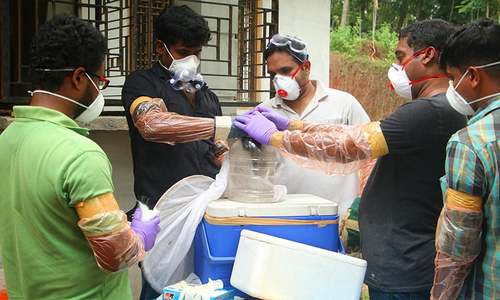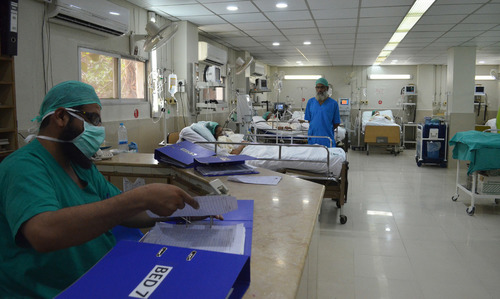The National Institute of Health has said the risk of occurrence of Nipah virus (NiV) in Pakistan is low. However, it has urged authorities at entry points across the country to remain vigilant.
The virus, according to the World Health Organisation (WHO), was first recognised in 1999 during an outbreak among pig farmers in Malaysia.
It can be transmitted to humans from animals (such as pigs and bats) or contaminated food and can also be transmitted directly from human-to-human. Fruit bats of the Pteropodidae family are the natural host of Nipah virus.
There is no treatment or vaccine available for either people or animals. The primary treatment for humans is supportive care.
In recent months, cases of the Nipah virus have resurfaced in India’s Kerala, prompting the state to shut down schools and test hundreds of residents.
According to an advisory issued by the NIH on October 7, six NiV cases were reported in the Indian state in September this year and the virus resulted in two deaths.
“Previously countries including Bangladesh, Malaysia, Philippines, Singapore and India have also reported confirmed cases of Nipah virus in human. Although Nipah virus has caused only a few known outbreaks in Asia, it infects a wide range of animals and causes severe disease and death in people, making it a public health concern,” it said.
“It’s mode of transmission includes direct contact with infected animals or infected persons or their body fluids including nasal or respiratory droplets. Symptoms may appear four to 14 days after exposure. The key signs of the infection include fever, headache, muscle pain, fatigue, nausea, vomiting, respiratory issues, confusion, seizures and coma,” it pointed out.
Talking about Pakistan, the advisory said the overall risk of disease occurrence in the country was low and to date there was no report of documented animal or human cases of the infection.
“However, there are several factors which could allow NiV emergence in Pakistan like evidences of the presence of Pteropus giganteus species of bats, international travel and long border with India where NiV outbreak has been documented,” it said.
The NIH also highlighted a number of precautionary measures that can be taken by authorities to prevent the occurrence of NiV in Pakistan.
“Raising awareness about the risk factors and mitigating measures are key to reducing the risk of NiV exposure and transmission. The present options to prevent secondary transmissions are active case finding, contact tracing, isolation and quarantine of cases and their contacts.
“Community awareness regarding consumption of fruits only after proper washing and avoiding ingestion of partly consumed fruits which may be contaminated with secretions from fruit bats,” it said.
The advisory further stated that health care professionals should be aware of the signs and symptoms of the virus, obtain travel history when assessing patients, practice “standard infection control precautions” and share suspected NiV case samples with the NIH.
“For early detection and implementation of preventive and control measures, the federal and provincial/regional health departments, points of entries (especially the airports under the Border Health Services), hospitals, clinicians and laboratory personals (public and private) and livestock and dairy departments are required to stay vigilant and notify the health authorities about any suspected case/event of NiV as per WHO case definition,” it said, adding that the NIH was closely monitoring the situation.













































Dear visitor, the comments section is undergoing an overhaul and will return soon.